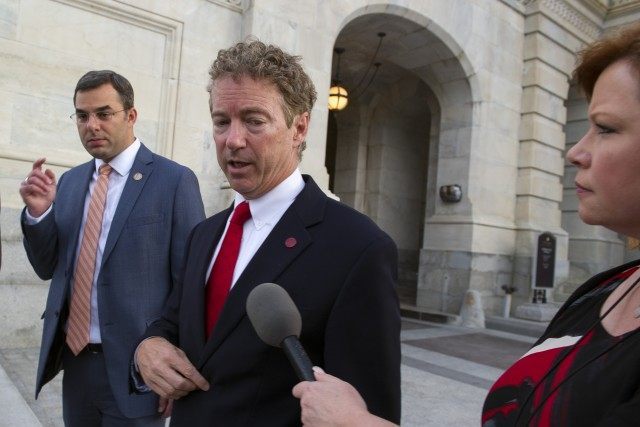Capitol Hill got a shock from the junior senator from Kentucky and former Republican candidate for president Sen. Rand Paul (R.-Ky. when he slammed the brakes on one of the top legislative priorities of the left-wing Environmental Defense Fund.
“Every day in my office, business comes into my office, and what do they say? ‘We’re regulated to death! We’re sick and tired of regulators from the executive branch that are out of control,’” said Sen. Rand Paul (R.-Ky.), who took to the Senate floor May 27 to object to the quick consideration of S. 697, the Frank R. Lautenberg Chemical Safety for the 21st Century Act.
“What does this bill do? It takes power away from the states and creates a new federal regulatory regime,” he said.
The liberty conservative’s maneuver was much simpler than his nearly 14-hour filibuster that delayed the confirmation of CIA Director John Brennan three years ago. This time, the senator simply refused to join “unanimous consent,” or U.C. It is how the GOP Senate leadership conducts the vast majority of Senate business—without debate and without a recorded vote.
Paul, an eye surgeon, who still treats patients, said his other objection to the bill was that he had not read its 180-pages that were given to him less than two days before.
“I told people, everybody involved with this, I just want to read the bill,” he said. “It deserves to be read, to be understood. I object to just rushing this through and saying: ‘No, you can’t read the bill.’”
In the House, the Republican leadership smoothed the path for the bill, which passed the lower chamber 403 to 12. After the vote, the Environmental Defense Fund specifically thanked two allies of Speaker Paul Ryan (R.-Wis.): Rep. Fred Upton (R.-Mich.) and Rep. John Shimkus (R.-Ill.), who are members of Ryan’s House Republican Steering Committee.
“Today’s broad, bipartisan vote shows meaningful progress is still possible in Washington,” said Elizabeth Thompson, EDF’s chief Capitol Hill lobbyist. “Solutions to big problems are not easy — they require collaboration, putting aside differences and working hard to find the common ground. The result of that hard work is going to be a major advance for public health.”
The bill was a complete overhaul of the 1976 Toxic Substances Control Act that was written with heavy input from unions and the chemical industry, in addition to the environmental lobby.
Big chemical companies fought for provisions that preempt state laws. As seen in lobbying efforts by other industries, the big chemical companies prefer to deal with a single regulator in Washington, rather than the horse blanket of states. The Lautenberg Chemical Safety Act wipes out more than 150 laws in 35 states that regulate chemical safety and gives the new regulatory regime approval authority over the 2,000-odd new chemicals introduced into commerce annually.
The bill also virtually outlaws all animal testing, reduces process participation by businesses regulated, and creates new enforcement powers for the EPA—and agency that once surrounded and overwhelmed Gibson Guitar facilities with black-clad officers in full battle-rattle.
Speaking about the bill and his institution, Paul said: “We should think through how we do things around here.”

COMMENTS
Please let us know if you're having issues with commenting.